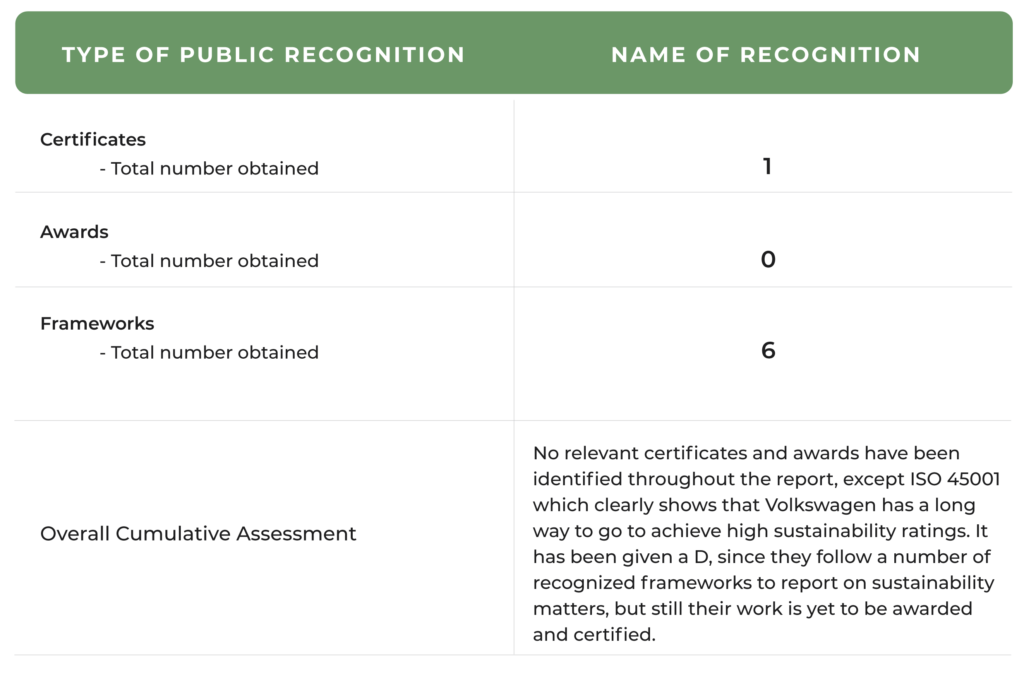
RATING

Neutral. Needs substantial effort to improve its rating.
SECTOR
Automotive
Chief Sustainability Officer
Ralf Pfitzner, Head of Sustainability of Volkswagen Group
Stock Exchange and Ticker
VOW3.DE
Website
Contact
Berliner Ring 2
Wolfsburg 38440 Germany
(0049) 5361 9 0
Listing
- N/A
Awards
- MSCI B = rating
- Sustainalytics 29.6 (medium risk)
- ISS ESG = C rating
- CDP Water Disclosure – A Rating
Revenue
Market Capitalisation
Employees
Content source
Volkswagen Sustainability Report
Evaluation of Volkswagen
Volkswagen has a long way to go, to prove itself as a sustainable leader in the automotive industry: at the moment, there are only commendable plans and no concrete action, earning the company a D rating and a neutral outlook.
The Volkswagen Group Sustainability Report was prepared in compliance with the GRI Standards of the Global Reporting Initiative (GRI). Ernst & Young GmbH Wirtschaftsprüfungsgesellschaft (EY) conducted a voluntary, limited assurance audit on the nonfinancial report to verify that its disclosures comply with the relevant statutory requirements. The nonfinancial report, published annually, was published on March 16, 2022 and in addition to information about the Group’s sustainability activities in the 2021 fiscal year (January 1 to December 31, 2021), this 2021 nonfinancial report also contains selected information from the 2022 fiscal year. The information in this report relates to the Volkswagen Group as a whole, unless indicated otherwise, and any information provided for the Group also applies to Volkswagen AG. The Group includes all major subsidiaries inside and outside Germany that are directly or indirectly controlled by Volkswagen AG, in addition to Volkswagen AG.
The report does not follow the SDG targets, the company only mentions the SDGs relevant to each of the business categories that is involved with sustainability activity, such as Decarbonization, Circular Economy, Responsibility in Supply Chain and Business, People & Transformation, Diversity and Integrity. The information on targets and progress is communicated in the focused areas mentioned above, but it is not easy to identify, nor easy to follow the progress on the targets identified.
There are plenty of initiatives that VW is currently working on that are aimed to deliver results by 2025 or by 2030. However some of the initiatives seem too ambitious to be accomplished, considering the little progress the company is making. For example, considering in 2021, sales of EVs in Europe were at 7.9%, sales are expected to increase to 70% in just 9 years. There are many factors that will contribute to these increases, which is not only controlled by VW, although they are developing partnerships and investing in technology to get there, there are also external considerations that may or may not contribute to the achievement of these goals. On the other hand, what can be controlled by VW, more in the people management, it also appears that the company is moving slow, with no specific targets set for diversity and inclusion of the workforce, training programs, considering the need for innovation and transformation. Furthemore, including Integrity, as a focus area to achieve Sustainability, the company wants to ensure that integrity and compliance maintain the same strategic and operational priorities such as sales revenue, profit, product quality or employer attractiveness. Anyone in the sustainability field could argue that as long as the priority remains sales, revenue and profit, over product quality or environmental impact, Volkswagen might not reach their commitments to sustainability. Additionally, considering the structure of the Members of the Board with voting rights, as identified in the NYT Article, by Jack Ewing does not provide a positive perspective towards achieving sustainable goals either.
No Awards identified throughout the report, only a readmission to the UN Global Compact in 2021; one ISO Certificate for occupational health and safety management systems that covers only 29% of the workforce, contribute further to the low rating.
Sustainability Scorecard
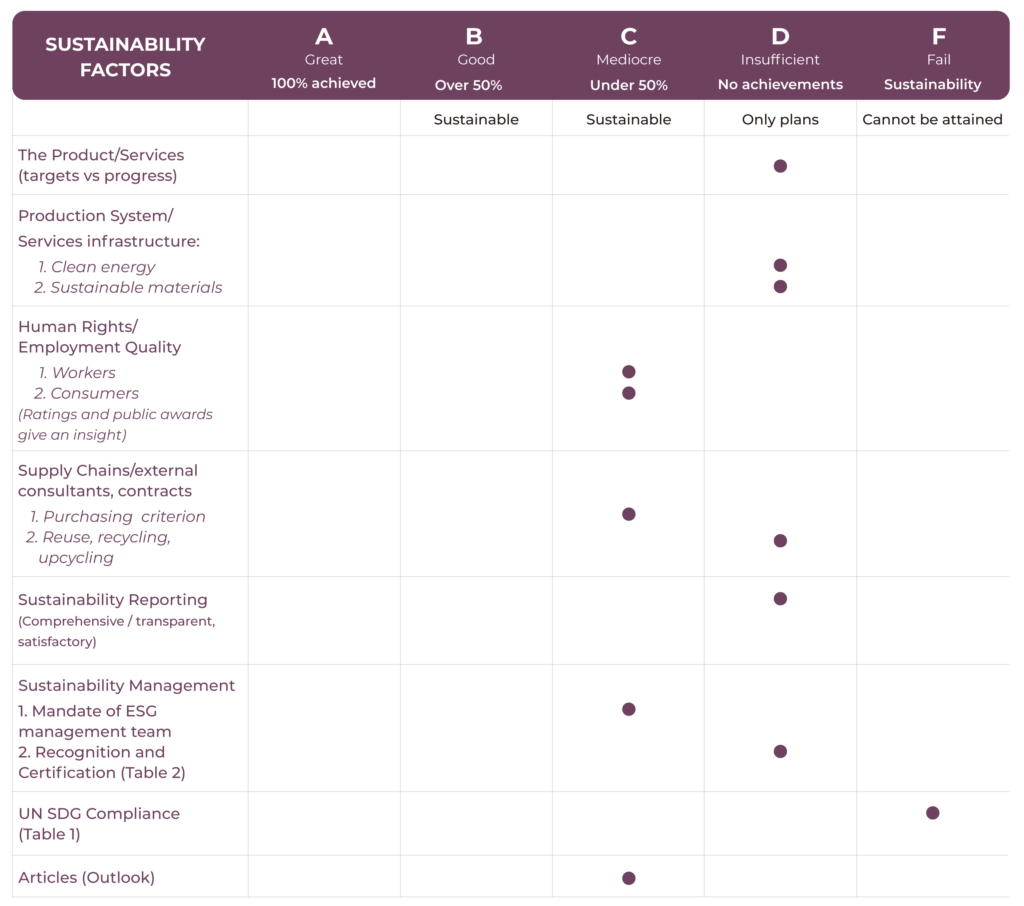
Volkswagen Company Activity
Volkswagen AG is the parent company of the Volkswagen Group. It engages in the production and sale of passenger cars and light commercial vehicles for the Volkswagen Passenger Cars and Volkswagen Commercial Vehicles brands. As a parent company, Volkswagen AG holds direct or indirect interests in AUDI AG, SEAT S.A., ŠKODA AUTO a.s., Dr. Ing. h.c. F. Porsche AG, TRATON SE, Volkswagen Financial Services AG, Volkswagen Bank GmbH and a large number of other companies in Germany and abroad. It operates through the following segments: Passenger Cars, Commercial Vehicles, Power Engineering, and Financial Services. The Passenger Cars and Light Commercial Vehicles segment develops vehicles, engines, and vehicle software; and light commercial vehicles; and produces and sells passenger cars and related parts. The Commercial Vehicles segment develops, produces, and sells trucks and buses; and offers parts and related services. The Power Engineering segment offers large-bore diesel engines, turbomachinery, and propulsion components. The Financial Services segment provides dealer and customer financing, leasing, banking and insurance, fleet management, and mobility services. The company also offers motorcycles.
Volkswagen Sustainability Activity - As per company declarations
The Group’s new strategy is “NEW AUTO – Mobility for Generations to Come”, in which Volkswagen Group wants to drive transformation from a vehicle manufacturer to a world-leading, software-driven mobility provider. They depict themselves as company where they redefine mobility while doing business climate neutrally and conscientiously. Additionally, according to Volkswagen, the NEW AUTO world will be free of emissions, smarter and above all more sustainable with more electric cars on the road. For 2021 to be recorded as an achievement, Volkswagen is the e-mobility market leader in Europe and the number two in the USA. The company is working on expanding the charging infrastructure in Europe, China and the USA to 45,000 charging points by 2025. They also have plans to build six battery factories by 2030 together with partners and deal with entire battery cycles. And electric drives bring economic advantages in the truck segment as well.
Certificate & Labels, Standards and Frameworks
- ISO 45001: occupational health and safety management systems
ISO 14001: Environmental Management and Responsibility
ISO 50001: Energy Management and Efficiency
EMAS: management instrument developed by the European Commission for companies and other organisations to evaluate, report, and improve their environmental performance.
Standards and Frameworks:
Aluminium Stewardship Initiative (ASI): responsible production, sourcing and stewardship in the global aluminium value chain.
Performance Standard
Chain of Custody
GRI Standards: help organizations to publicly report the impacts of their activities in a structured way, transparent to stakeholders. Holds the company against NO clear rating system.
FIA Three-Star Environmental Accreditation: The FIA Environmental Accreditation Programme is aimed at helping motor sport and mobility stakeholders worldwide to measure and enhance their environmental performance.
Gold Certificate of the German Association for Sustainable Building: As proof of this quality in construction, a DGNB certificate in platinum, gold or silver can be obtained. A bronze certificate can also be obtained for sustainable building operations or existing buildings.
Volkswagen in the news: Press and Social Media
The article presents facts that despite Volkswagen presenting an advantage over Tesla, in terms of the price for passenger cars and a new standardised platform, The Modular Electrification Toolbox, corporate governance experts, continue to express concerns over the lack of outside oversight, that may continue to contribute to the toxic corporate culture. Considering that voting rights belong 53% to the Members of the secretive Porsche and Piëch families, 20% to the government of the state of Lower Saxony, 17% to the sovereign wealth fund of Qatar and only less than 10% to the outside shareholders, this structure will not allow to expose the company to more scrutiny. Moreover, only one out of the 20 members of the Supervisory Board, is not a representative of the three main shareholders, nor a Volkswagen employee. In this type of governance structure, one could agree that decisions at the company level will be influenced by the interest of the three main shareholders.
The article is written by Georg Kell, a member of Volkswagen’s Sustainability Council and mainly discusses the company’s journey, from an ‘emission cheater’ to a ‘climate leader’. The council, formed in 2016, after the “Dieselgate” scandal was formed to help the company’s transformation into a world-leading provider of sustainable mobility. Many challenges were encountered along the way, from the diversity of the Council’s representatives, from different backgrounds and with specific skills, to high-ranking managers that had been working with diesel engines their entire life and lastly, union workers’ concerns over job losses due to e-mobility production and digitalization. Despite all these challenges, the Council worked together to propose a set of strategic changes to Volkswagen’s management, such as a technology shift with a focus on decarbonization; a policy shift advocating for ambitious standards and a cultural shift towards a more ethical, collaborative and purpose-driven company. Positive results from focusing on these changes came in the form of re-admission to the UN Global Compact where Volkswagen committed to embrace sustainability issues. Furthermore, the company’s climate leadership was acknowledged by the Science Based target Initiative for the best practices in terms of GHG emission reductions.
From a position where Volkswagen had to catch up with the transformation within the car industry, what they have accomplished, the world is now catching up. The Council’s contribution has been acknowledged by the CEO Diess, as a ‘driver and a corrective for our strategy”. Moreover, Georg Kell, mentions in the article that a spirit of innovation, motivation and collaboration, as well as continuing to see sustainability as an important driver, will still be needed to achieve the massive transformation that Volkswagen has embarked on.
Highlights from Volkswagen Sustainability Report
Achievements
- No achievements worth mentioning in this section
- Responsible Lithium Partnership in Chile
- Responsible Minerals Initiative (RMI)
- Global Battery Alliance (GBA)
- Drive Sustainability
- Responsible Mica Initiative
- Global Platform for Sustainable Natural Rubber (GPSNR)
- Responsible Supply Chain Initiative of the German Association of the Automotive Industry
- Moratorium against Deep Sea Mining
- German Agency for International Cooperation (GIZ)
- supported rubber farmers in Indonesia through the CASCADE (Committed Actions for Smallholders Capacity Development) project
- Aluminium Stewardship Initiative (ASI)
- International Platinum Association (IPA)
Weaknesses and Setbacks
- Not many indicators available to track the company’s progress towards sustainability
Targets vs Progress Reported
| Target | Results reported |
|---|---|
| Carbon Neutrality by 2050 | Measure with which CO₂ emissions can be avoided or reduced: - Address CO₂ in supply chains such as steel manufacturers to accelerate the switch to carbon-neutral products. For example, Volkswagen Passenger Cars brand will use green aluminium and tires products with low emissions CO₂ emissions will be a key criteria in the selection of relevant suppliers in the future. - All suppliers will be required to use certified power from renewable sources in the production processes 52 million euros across the Volkswagen Group to be invested in electric mobility by 2026 to increase the share of electrical vehicles in core markets EU, the US and China to more than 50% by 2030 - Increase the sales of Volkswagen Passenger Cars in EU by 2030 to 70% |
| Charging vehicles with 100% renewable energy: |
- Increase the number of public fast charging points in Europe from 400 to 18,000 by 2025 investing about 400 million euros and develop partnerships.
- Continue the expansion of public fast charging points in North America to some 3,500 through “Electrify America” In China to add 17,000 public fast charging points by 2025 through CAMS New Energy Technology Co., Ltd.(CAMS) - Volkswagen supported the construction of a solar plant to produce 170 million kilowatt/year - More projects under development to generate some 7 terawatt hours (TWh)/year of additional green electricity by 2025 - E-cars to be part of the energy system, specifically the Volkswagen own Modular electric drive matrix (MEB) platform to store electricity from the solar plant and feed it back into the home network, if needed, from 2022 onwards |
| GOTOZERO IMPACT LOGISTICS: | - Optimization of the transport network and logistics processes to include low-emission technologies in the transportation of production materials and finished vehicles - Move shipments from road to rail and achieve complete avoidance of CO₂ through the use of green electricity on electric railroad lines in Germany in collaboration with Deutsche Bahn AG - Transport new vehicles on the North Atlantic using low-emission liquefied natural gas (LNG) ships such as two LNG car carriers since 2020 and four more ships with dual fuel engines that can be powered with LNG from the end of 2023 - Two car carriers in operation with biofuel produced from plant-based waste material (waste oil from the food industry) - Cut emissions in internal mobility processes, a carbon calculator is to be trialled by the Board of Management and top management in a pilot project - Up to €25 million per year the Group has allocated to a CO2 fund that funds projects worldwide aimed at reducing GHG emissions - Measures for decarbonizing the sales network as part of the Sustainability@Retail initiative. - Construction of a biogas plant for the ŠKODA brand in India - Support technologies to increase the proportion of recycled plastics for vehicle components |
| Offset Projects | - Volkswagen Group chooses to offset unavoidable emissions from the supply chain, production, etc., through climate protection projects with high certification standards, such as the Verified Carbon Standard (VCS) in combination with the Climate Community and Biodiversity Standards (CCB) or the Gold Standard. - Volkswagen Group Innovation’s “Climate Engineering” focuses on activities for evaluating direct-air-capture technologies and their industrialization to establish broad access to affordable negative emissions for industry and society in the short to medium term. - The Group has signed a memorandum of understanding for the development of relevant projects to permanently remove CO₂ from the atmosphere with its Icelandic project partner Carbfix, which turns CO₂ into natural stone through mineralization in a certified process. |
| Reduce greenhouse gas emissions in production by 50.4% by 2030, compared with 2018 | - In 2021 reduced emissions by 20.7% since 2018 - 9 production sites are already operating carbon neutral, including compensation measures |
| Intermediate goals: - Reduce carbon footprint of its passenger and light commercial vehicles by 30% per vehicle by 2025 - Volkswagen brand specifically plans to reduce its CO₂ emissions/vehicle in Europe by 40% by 2030 - Eu Target: TARGET: The European Commission is pursuing a target of a 15% reduction in CO₂ by 2025 (less than 105 gCO₂/km for the EU new passenger car fleet and by 2030, a 55% reduction is proposed (less than 60 gCO₂/km). - The company expects that the EU new passenger car fleet will be able to meet the target for 2025 and outperform the target for 2030 - US Target: Greenhouse Gas (GHG) and Corporate Average Fuel Economy (CAFE) regulations set targets for every manufacturer of passenger cars and light commercial vehicles, factoring in credits for “air conditioning” and “off cycle credits”. However, a delay in the confirmation by the authorities of model years differing from the calendar year allows flexibility in reporting. For 2025, the VW Group set a CO₂ target of around 110 g CO₂/km in the USA |
- EU PROGRESS: The Volkswagen Group’s new light commercial vehicles fleet in the EU emitted an average of 202 gCO₂/km (WLTP) in the 2021 reporting period, compared with a statutory target of 198 gCO₂/km (WLTP) due to the shortage of semiconductors and the resultant limited availability of vehicles. - US PROGRESS: Giving the flexibility mentioned above, the Volkswagen Group claims that they succeeded in complying with applicable requirements (subject to confirmation by the authorities, for model year 2021) , specifically, that he passenger car and light commercial vehicle fleet’s GHG CO₂ figure for model year 2021 (internal data as of September 2021) is an average of 147gCO₂/km (model year 2020: 151gCO₂/km) compared with a statutory target of 142 gCO₂/km (model year 2020: 139 gCO₂/km). - The figure mentioned for model year 2020 is subject to confirmation by the EPA and CARB authorities. We anticipate a CO₂ target of around 110 g CO₂/km in the USA for 2025 and therefore expect to be able to achieve this target. We will increase the electric vehicle proportion. |
UN SDGs Compliance Analysis
Progress made toward SDG targets
As reported by Volkswagen
The Volkswagen Group does not report specifically on the SDGs Targets framework, but for each of the Focused Areas in the Sustainability Report, they link the relevant SDG, such as:
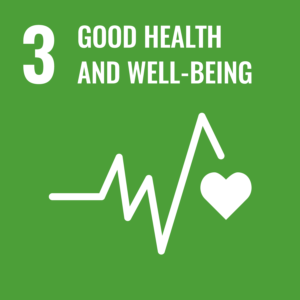
- 29% of employees working in sites ISO 45001 certified
- Accident frequency index to show the number of accidents at work as a proportion of the total of all hours worked: in 2021, 6.8 (2020: 5.5) in Volkswagen AG
- Accident severity index expresses the severity of the accidents reported by showing the total number of working days lost due to accidents reported in the fiscal year, as a proportion of the total of all hours worked: in 2021, 9.1 (2020: 7.4) in Volkswagen AG
- The Volkswagen Group and Volkswagen AG recorded one fatal accident involving own employees in 2021

- In 2021, the percentage was 16.3%, 1.2 percentage points higher than the previous year’s level
- The Volkswagen AG-wide Kompass 2.0 program provides female talent with guidance and a decision aid to start a management or leadership career, 162 employees are taking part in the current 2021/2022 round of the program.
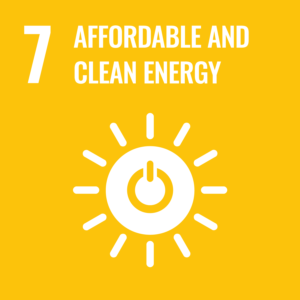
- All suppliers will be required to use certified power from renewable sources in the production processes
- 52 million euros across the Volkswagen Group to be invested in electric mobility by 2026 to increase the share of electrical vehicles in core markets EU, the US and China to more than 50% by 2030.
- Volkswagen supported the construction of a solar plant to produce 170 million kilowatt/year

- Internationalisation in top management 25.0% by 2025 In 2021 was 20.3%, vs 18.7% in 2020
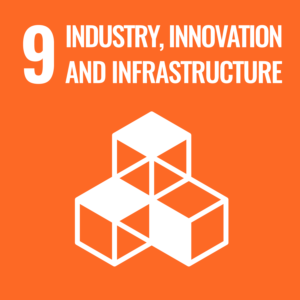
- Address CO₂ in supply chains such as steel manufacturers to accelerate the switch to carbon-neutral products. For example, Volkswagen Passenger Cars brand will use green aluminium and tires products with low emissions.
- First facility for recycling high-voltage vehicle batteries opened in 2021, initially designed to recycle up to 3,600 battery systems per year in pilot operation
- The goal is industrialised recovery of valuable raw materials such as lithium, nickel, manganese and cobalt in a closed loop and also of aluminum, copper and plastic, with a recycling rate of more than 90% in the future.
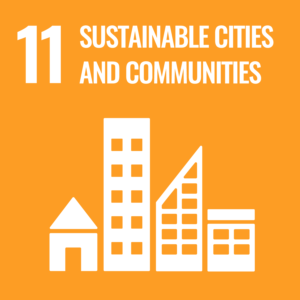
- Increase the number of public fast charging points for EV in Europe from 400 to 18,000 by 2025 investing.

- Support technologies to increase the proportion of recycled plastics for vehicle components.
- Volkswagen is currently working on converting its own electricity generation towards advancing energy-efficiency projects in its 120 production facilities with 1,544 measures for saving energy were implemented in 2021
- First facility for recycling high-voltage vehicle batteries opened in 2021, initially designed to recycle up to 3,600 battery systems per year in pilot operation
- The goal is industrialised recovery of valuable raw materials such as lithium, nickel, manganese and cobalt in a closed loop and also of aluminium, copper and plastic, with a recycling rate of more than 90% in the future.

- Move shipments from road to rail and achieve complete avoidance of CO₂ through the use of green electricity on electric railroad lines in Germany in collaboration with Deutsche Bahn AG
- Volkswagen Group chooses to offset unavoidable emissions from the supply chain, production, etc., through climate protection projects with high certification standards, such as the Verified Carbon Standard (VCS) in combination with the Climate Community and Biodiversity Standards (CCB) or the Gold Standard.
- Volkswagen Group Innovation’s “Climate Engineering” focuses on activities for evaluating direct-air-capture technologies and their industrialization to establish broad access to affordable negative emissions for industry and society in the short to medium term.
Sustainability Certificates, Awards and Listings
